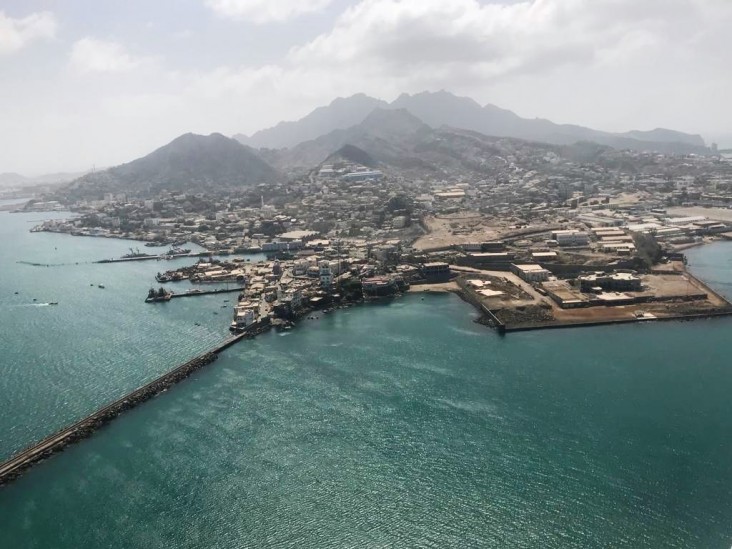Speeches Shim

For Trade Facilitation in Yemen
“The automated customs data project represents a real turning point, and the kind of hope that will inspire change and innovation in the Yemen Customs Authority. This long-awaited step will achieve a qualitative leap in terms of simplifying customs procedures—reducing clearance time and costs, and introducing an electronic single window.” -- Abdullateef Al-Sanabani, Yemen Customs Authority
Trade is an essential lifeline in Yemen, bringing in critical supplies of food and fuel. However, existing bottlenecks impede the flow of goods into the country. To facilitate vital trade and imports into Yemen, USAID is supporting the upgrading of customs procedures in Yemen’s major Port of Aden, introducing modernization systems that are building efficiencies and saving time and costs for both traders and trading authorities.
For the past two years, the USAID Yemen Economic Stabilization and Success (YESS) project has supported the Yemen Customs Authority in piloting an application at Aden Port that allows the electronic submission and review of customs forms for declared goods. The web-based tool, known as the Automated System for Customs Data (ASYCUDA) World, was designed by the UN Conference on Trade and Development as an integrated customs management system for international trade and transport operations in a modern automated environment.
YESS worked closely with Yemeni authorities to ensure the ASYCUDA World application integrates all of the country’s relevant customs, trade, and tax policies and requirements. The tool includes an electronic single window for users, which harmonizes all the various customs forms and regulations from multiple government agencies to simplify and speed up the customs clearance process.
The range of imported products subject to technical clearance and conformity assessment measures is vast. The YESS team conducted an extensive review of trade-related legislation and met with a wide range of agencies dealing with trade (e.g., Ministry of Industry and Trade, Ministry of Health’s Supreme Board of Drugs, Ministry of Agriculture and Irrigation, and the Yemen Standardization and Metrology Agency) to confirm that the lists of controlled products were consistent with Government of Yemen needs, World Trade Organization commitments, and other international best practices.
“The single window links the trader to the Yemen Customs Authority and other control agencies,“ explains AbdulHameed Al-Husseini, Manager of Customs Clearance with Al-Nada Center for General Services. “It sends automatic notifications to the competent authorities regarding the controlled goods being declared, which in turn rapidly assess the requests and respond electronically without the need to personally go to those agencies.”
To develop the ASYCUDA World prototype and pilot for Yemen, YESS adopted a participatory approach with the Yemen Customs Authority and information technology (IT) officials to strengthen their engagement with and ownership of the new system. The YESS team conducted three needs-assessment workshops with the officials, and provided on-the-job training to make sure the system was well adapted to include all the relevant requirements and documentation.
With the launching of the application’s pilot in Yemen, YESS undertook further training sessions for both public- and private-sector stakeholders to promote their use of the system and understanding of its advantages. They reached out to people like Mr. Al-Husseini, whose company specializes in tailored customs logistics services for international humanitarian organizations. As someone who works with clients needing authorizations and certifications from multiple government agencies, Mr. Al-Husseini sees true advances for the private sector and its relationship-building with the public sector from the application of the ASYCUDA World pilot.
“There is no comparison between the advantages of the modern customs automated system, ASYCUDA World, and the system that had been in use in Yemen for almost two decades,” says Mr. Al-Husseini. “The new system eliminates duplication, standardizes and simplifies procedures, and helps to curb corruption by removing friction and collusion between government employees and traders or customs brokers.”
For Abdullateef Al-Sanabani, who is the General Manager of the IT Department and Project Manager of ASYCUDA World at the Yemen Customs Authority, the potential benefits for improving trade facilitation and management are even more far-reaching.
“The hope that project will inspire change will certainly not be confined to customs only, but will extend to all parties involved with border customs management, including compliant traders and transport companies, in addition to all those who rely on trade data derived from the automated customs system, such as the Tax Authority, the Central Bank, and the Ministry of Planning and International Cooperation,” concludes Mr. Al-Sanabani.
USAID’s Yemen Economic Stabilization and Success (YESS) activity supported self-reliance and resilience by facilitating trade, increasing employment, supporting sustainable livelihoods, and stabilizing crucial macroeconomic policy issues. YESS was part of the USAID Middle East Economic Growth Best Practices Project (MEG), which provided knowledge and tools to support economic growth and reform across the Middle East and North Africa.

Comment
Make a general inquiry or suggest an improvement.